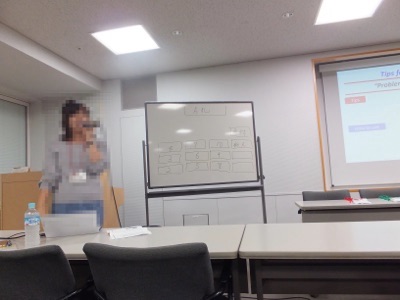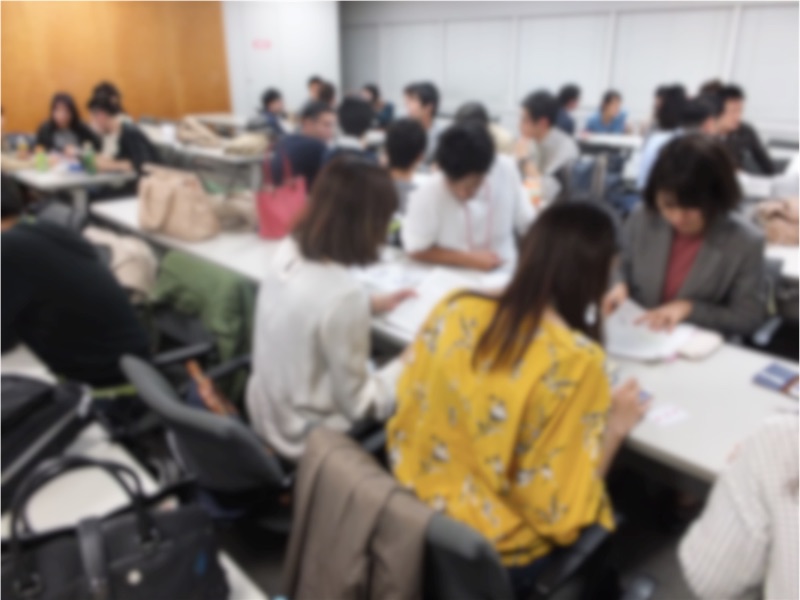1.前半マテリアルの紹介

2.ディスカッション中の様子

:::::::::::::::::::::::::::::::::::::::::::::::::::::::::::::::::::::::::::::::
《 今回のworkshop 》
○workshop参加人数:60名(うち新人の方:5名)
○【前半】:How to entice more people to E’s club
○【後半】:Househusband
:::::::::::::::::::::::::::::::::::::::::::::::::::::::::::::::::::::::::::::::::
≪FIRST HALF≫
[How to entice more people to E’s club]
I start to participate in “Global Agenda Seminar”at Roppongi Academyhills,
instructed by Prof.Yoko Ishikura*,an independent consultant.
In this class, we are assigned to the PJ team with actual clients
such as British Chamber of Commerce in Japan(BCCJ),
and make a proposal to solve their problem.
Today, I would like to introduce my class activity with you.
Imagine you are assigned to the PJ team with client “E’s club”,
and you need to make a proposal to solve their problem as a consultant.
Hope you enjoy!!
[Situation] *It does not reflect actual situation of E’s club.
The Clients: E’s Club
Problem
・The Number of participants is decreasing
・The percentage of repeaters is decreasing
・The proportion of young generation is decreasing
・The percentage of women is decreasing
Assumption of why these problems happen
・The contents of E’s club is not interesting or unique enough
・The Promotion does not reached out to the potential participants
(currently, our promotion is mainly conducted by HP, not
SNS, such as Facebook or blog)
・Different types of English learning services are introduced with reasonable price
(such as reasonable English class, English cafe and Skype lesson)
[Procedure]
1. Please discuss following items and make a proposal for E’s club in each team
(The proposal sheet to be distributed to each group)
・what is the major issue
・what is the reason for the major issue above
・which direction should E’s club is headed for the future
・what can be done as a countermeasure
・what can be expected with countermeasure above
(measurable merit, and non-measurable merit)
2. Please share your proposal sheet with group next to your group[18:45-18:50]
[2.5mins* in each group: total 5mins]
*1min: make presentation, 1.5mins Q&A
3. Some group ideas to be shared to all members.(randomly selected) [18:50-19:00]
[group presentation to all, comment from E’s club leader]
≪LATTER HALF≫
<Agenda>
Househusband
<Article>
House husbands gaining acceptance in Japan as gender stereotypes ease
House husbands gaining acceptance in Japan as gender stereotypes ease
One weekend afternoon in March, some 30 single men and women gathered at a matchmaking event in Tokyo’s Yotsuya district in the hope of meeting their future partner. What was unusual was that the participants comprised men willing to become stay-at-home house husbands and women looking for such a partner.
During a workshop to introduce themselves, the men talked about their passion for cooking and about the importance of males doing homemaking and fathers bringing up children.
“I’m not looking to become a full-time house husband,” said a 35-year-old male participant who declined to be named. “But if I have a child in the future, I want to play a leading role in domestic work and child-rearing.”
One 47-year-old said he is more than willing to support a future wife who wants to continue working instead of staying at home and raising kids.
“I really like doing the laundry, cooking and other domestic chores,” the man said.
Organized by a group of house husbands that calls itself the tongue-in-cheek Himitsu Kessha Shufu no Tomo (Secret Society, Friends of House Husbands), the event comes amid nationwide efforts to overturn social stereotypes and promote more versatile family arrangements.
Launched last year among more than 20 at-home dads who got acquainted through Facebook, the group has held a range of events, including panel discussions and a ceremony to honor people who helped increase the status of house husbands.
The group hopes that 30 percent of married couples by 2020 will be working wives and stay-home husbands.
It arrived at the figure half in jest after Prime Minister Shinzo Abe’s pledged to raise the ratio of women in managerial positions to 30 percent by 2020. But the group is serious about wanting to change the prevailing patriarchal culture in which men are considered the nation’s breadwinners.
“Our true goal is to increase lifestyle choices for married couples. We want to realize a society where people can lead more flexible lives, and where they can choose a role in the household depending on their circumstances,” said Taizo Horikomi, the 39-year-old head of the group and an at-home father of two children.
“I believe the advancement of men in parenting and domestic work is also crucial to achieving the government’s goal of increasing female participation in the workplace,” he said.
If a popular new buzzword is anything to go by, the phenomenon is gaining recognition. The word ikumen (men engaged in child-rearing and homemaking) is now in broad use, suggesting Japan has departed from stereotypical gender roles in recent years.
But from the standpoint of members of the group, themselves homemakers and stay-home parents, progress is only partial because many men claim falsely to be ikumen when all they do is wipe the table after dinner.
They say in an era where both men and women have jobs, men should regard housework as part of their responsibilities.
There is resistance to this.
A 2014 Cabinet Office survey found that 44.6 percent of people support the notion of “men-at-work, women-at-home.” This marked a decline from 60.1 percent in 1992, but the figure shows traditional gender views persist, Horikomi said.
Most people who supported the idea in the survey believed it is better for mothers to look after children.
“There are still many people who have the outdated notions. We need to change such stereotypical views,” Horikomi said.
In Horikomi’s household, he is the one who prepares the children’s lunches, takes them to the hospital when they fall ill, and serves on the Parent-Teacher Association of his son’s elementary school.
But in the general world of parenting, such fathers’ presence is almost invisible, he said.
“When my son was 4 months old and I took him in for a health check, the first thing the doctor asked me was where was the mother, saying the parent who takes care of him should have come. But I was the one who was taking care of my son every day,” he said.
He recalls with wry amusement a letter from his son’s nursery school that said the children enjoyed the lunches prepared by their mothers, when in Horikomi’s case, he was the one who made the meals.
There are no official data on the number of house husbands in Japan, but a sense of their number can still be obtained from government figures. One regarding family demographics suggests that the number of husbands who are financially dependent on their wives is on the rise.
According to welfare ministry data, women who claimed spousal tax exemptions for their husbands in fiscal 2013 stood at around 110,000, up from 40,000 in 1997. Meanwhile, working men who claimed spousal tax exemptions for their wives declined to 9.3 million in fiscal 2013, from 11.9 million in 1997.
In Horikomi’s case, the decision to quit his job to become a house husband came naturally when his first child was born nine years ago.
A graduate of the prestigious University of Tokyo, Horikomi worked as an engineer at a major automaker in Japan. But when the boy was born in 2007 and his researcher wife was unable to take child-rearing leave because she was going to study at Stanford University in California, Horikomi took two-year parental leave instead. He later quit his job when his wife’s stay in California was extended for another year.
He now works from home as a freelance translator while looking after their two sons ― aged 9 and 4 ― and his wife remains the primary earner.
“I believe it should be OK for either gender to take care of the children or do the housework,” Horikomi said. “After all, probably the only thing men can’t do in rearing a child is breast-feeding.”
Horikomi said he is often asked whether he regrets abandoning a promising career, given that many of his peers now hold managerial positions. It has never bothered him, he said.
“Well, I envy them for having a lot of money,” Horikomi laughed. “But that’s about it.
“It’s quite hard to earn money as a freelancer. … But my happiness exceeds that.”
<Questions>
Q1.When you were a child, how did your parents(parent) share household chores?
Did you help?
Q2.Do you want to be a full-time househusband/housewife?
-Why/Why not?
Q3.Do you want to marry a full-time househusband/housewife?
(If your boyfriend/girlfriend wanted to be a full-time housemaker,what would you say?)
-Why/Why not?
Q4.Talk about your ideal workstyle and sharing houseworks after marriage.
Is it influenced by your parents(parent)?
Q5.What are advantages and disadvantages of men’s becoming a househusband?
How does it affect children and marital relationship?
Q6.Recent survey says Japan has one of the worst rankings for sharing housework equally between men and women in the world.
(*refer to attached data)
-What is the cause?
***********************************************************
私たちと一緒に英語コミュニケーション能力を鍛えませんか?
ご興味を持たれた方は、
入会申込フォーム
https://english-speaking-club.com/cms/?page_id=93
よりお申し込みください。お待ちしています!
***********************************************************